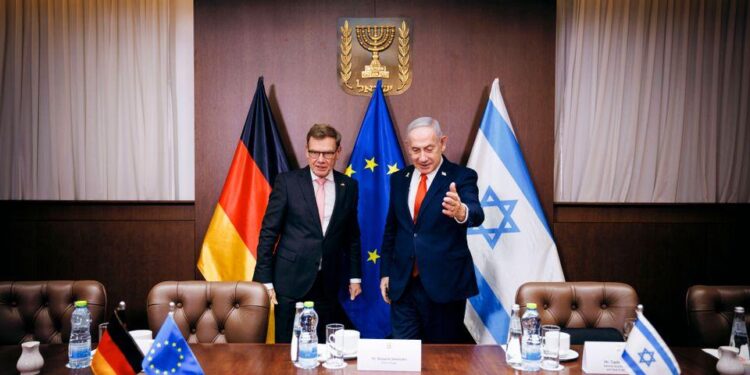Recent polling data reveals that a majority of Americans do not support Israel’s ongoing military actions in Gaza, highlighting a significant shift in public opinion amid escalating conflict. As violence intensifies in the region, surveys indicate growing skepticism and concern among the U.S. public over the humanitarian impact and broader implications of the war. This emerging stance contrasts with historically strong American support for Israel, underscoring the complexities and evolving perspectives surrounding the Israeli-Palestinian conflict.
Public Opinion Shifts as Majority of Americans Express Opposition to Israel’s Gaza Offensive
Recent polls reveal a significant change in American perspectives regarding the ongoing conflict between Israel and Gaza. Contrary to previous decades where strong support for Israeli military actions was prevalent, a growing portion of the population now expresses opposition to the current offensive. Analysts attribute this shift to increased media coverage highlighting civilian casualties and humanitarian concerns, as well as a broader reevaluation of U.S. foreign policy priorities in the Middle East.
Key factors contributing to this opinion change include:
- Heightened awareness of Gaza’s humanitarian crisis
- Concerns over proportionality and civilian impact
- Generational differences in foreign policy attitudes
- Influence of grassroots advocacy and social media campaigns
| Demographic | Support for Offensive | Opposition |
|---|---|---|
| 18-29 years | 32% | 58% |
| 30-49 years | 45% | 48% |
| 50+ years | 54% | 40% |
Detailed Polling Reveals Demographic Divides and Key Factors Influencing Views on the Conflict
Recent polling data uncovers stark contrasts in American opinions regarding the conflict in Gaza, reflecting deep demographic divides. Younger voters, particularly those aged 18 to 34, are significantly more likely to oppose Israel’s military actions compared to older generations. This divergence is also evident across political affiliations, with Democrats and Independents showing less support for the war than their Republican counterparts. Ethnic and religious backgrounds further complicate perspectives, as respondents identifying as Hispanic or Muslim tend to express more critical views of Israeli policy, while evangelical Christians predominantly back it.
Key factors influencing public attitudes include media consumption, personal values, and awareness of the conflict’s humanitarian toll. Polls reveal that individuals relying on social media platforms for news are more inclined toward anti-war views, contrasting with those who primarily follow mainstream broadcast news. Moreover, concerns about civilian casualties and the broader implications for regional stability strongly correlate with opposition, while those emphasizing Israel’s right to self-defense demonstrate higher support. The table below summarizes some of the core demographic groups and their corresponding support levels:
| Demographic Group | Support for Israel’s War (%) | Opposition to War (%) |
|---|---|---|
| Age 18-34 | 32% | 58% |
| Age 55+ | 65% | 28% |
| Democrats | 29% | 62% |
| Republicans | 71% | 22% |
| Hispanic Americans | 38% | 54% |
| Evangelical Christians | 74% | 18% |
Experts Call for Increased Diplomatic Efforts and Humanitarian Focus to Address Escalating Tensions
Leading analysts and international relations experts argue that a shift toward robust diplomatic engagement is essential to de-escalate the ongoing conflict. They emphasize the need for renewed peace talks involving all key stakeholders, coupled with increased mediation support from neutral parties. This approach aims to foster dialogue that prioritizes constructive negotiation over military action, recognizing that sustainable solutions require the cooperation of global powers and regional actors alike.
Moreover, humanitarian organizations spotlight the urgent need for enhanced aid delivery to Gaza’s civilian population, which faces critical shortages of food, medical supplies, and safe shelter. Experts advocate for:
- Unimpeded access for humanitarian convoys facilitated by international bodies
- Implementation of localized ceasefires to enable emergency relief operations
- Strengthening funding and logistical support for frontline health services
| Priority Area | Recommended Action | Expected Impact |
|---|---|---|
| Diplomatic Channels | Facilitate multilateral peace talks | Reduce hostilities and build trust |
| Humanitarian Access | Guarantee safe passage for aid | Alleviate civilian suffering |
| Health Services | Boost emergency medical support | Prevent healthcare system collapse |
In Retrospect
As polling data continues to reveal a growing divide in American public opinion on the conflict in Gaza, the findings signal a shift in U.S. sentiment that could influence future foreign policy decisions. With a significant portion of the population expressing opposition to Israel’s military actions, the debate over America’s role in the region remains as contentious as ever. Observers will be closely watching how these attitudes evolve as the situation on the ground develops and as political leaders respond to the changing views of their constituents.














